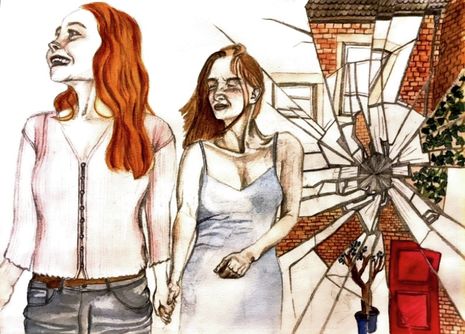Grappling with grief in 8 weeks
Lauren Welsby-Riley explores the experience of bereavement as a student

Grief has been described to me as feeling like a bouncy ball inside of a box. Every time the ball hits one of the sides of the box, you feel the pain of grief in all its intensity. As time passes, the ball does not decrease in size, or velocity, nor do its collisions with the sides become any less painful. But the box gets bigger, so the collisions become less frequent, and you might even find ways of padding the inside of the box to help you cope.
But what happens when you, and your ball, attend one of the most academically rigorous institutions in the world?
To find out more about what grief looks like inside the Cambridge bubble, I spoke to several students about their experience with life after loss.
“I felt totally blindsided, and guilty for not making the most of the time I spent with him at Easter because I had so much coursework to do”
The structure of the Cambridge term, designed to allow students to throw themselves entirely into their work for 8 weeks, with at least 6 weeks off at the end for recovery, is highly effective on paper. But as Ella, a recent HisPol graduate from Sidney Sussex points out, this structure does not allow room for much else, considering “your personal life is forced into those 8 weeks where you’re meant to be working.”
Ella lost her grandfather, to whom she was particularly close, just two weeks before her final exams. She spoke to Varsity about how her personal and academic life was disrupted by this loss.
“I felt totally blindsided, and guilty for not making the most of the time I spent with him at Easter because I had so much coursework to do,” Ella told us. It became clear from the interviews that guilt is something of a universality when reflecting on mourning. This can take on a few different forms; perhaps, like Ella has described, there is guilt surrounding not properly taking advantage of the time you had left with your loved one. There is also a particularly Cambridge stigma around taking time out of your studies to go home to be with your family during a difficult time.
For Ella, as an international student whose grandparents lived in Australia, this was especially poignant. Of the process of getting permission to fly out for the funeral, Ella said, it was “the first time I had ever met or spoken to my tutor, so going from initial introductions to suddenly crying and debating whether or not I could go home gave me whiplash.”
“I was [in Australia] for two days, and on the day of the funeral I came back from the service and had to finish my timed essay for my revision supervision the next day. Then I had 2-3 days to get over my jet lag before I sat my first exam. It was just really, really intense.”
Cambridge, for better or for worse, invests the overwhelming majority of its staff and resources into creating the best academics possible, in order to keep results (and university league table rankings) high. So when somebody you love dies right at the most important moment of your educational career, there is an enormous amount of pressure to keep up with your work despite the emotional turmoil you are experiencing. We received positive comments from all of our interviewees about support from university and college staff, with one student describing her college nurse as a “godsend,” and another praising the wellbeing team who were with her when she received the news that her grandmother had passed away.
However, there were also several complaints about the university’s handling of bereavement during exam term. One student told us about the “casual cruelty” she received at times from staff, including one who told her that her grandfather “would have wanted [her] to sit through [her] exams,” and described feeling like she was constantly reminded that her finals should be her main priority. In the end, the only mitigation she received for her exams was an exam warning which would see one of her marks being dropped if it was drastically lower than the rest of her papers.
The University’s Exam Access and Mitigation Committee has come under fire in the past for being, at best, needlessly intrusive or difficult to navigate, and at worst, dangerously negligent.
Support can also come from unexpected places, as was the case for Michael, a second year MML student at Trinity, who described the chaplaincy at Fisher House as a “great source of comfort” for him.
“These routines are most likely an irrational placebo effect of sorts, but why deprive ourselves of the momentary comfort for the sake of being logical?”
As someone who never fails to point out a white feather when I see one, I am constantly fascinated by the symbols and repeating images that the grieving mind is able to pick up on. Speaking to one student about this phenomenon, we both agreed that these routines are most likely an irrational placebo effect of sorts, but why deprive ourselves of the momentary comfort for the sake of being logical? This student took a leaf home because it landed on her dog while walking, and sees her dad in foxes while out and about. Amelia, a second year HSPS student at Trinity Hall, can’t imagine she will ever spend the £10 note she found in the last Hanukkah card her grandmother wrote her before she passed.
When speaking to students about how they feel they could be better supported by the people around them, a general disdain for “I’m so sorry for your loss” as a response came up repeatedly. One student from Girton, whose father passed away suddenly in March, said: “It seems a bit trite. It’s like when someone says ‘thank you’ and you respond ‘you’re welcome’ - it doesn’t really mean anything, it’s just words.”
Both this student and Amelia expressed that they appreciated casual sympathy far more than “the pity face and the head tilt.”
Perhaps a less frequently spoken about facet of experiencing grief while attending Cambridge University is the effects on a student’s ability to enjoy their social life. Ella described feeling immensely bittersweet about the end of year festivities which, for her, would mark the end of her time at Cambridge altogether.
“While my family was in Australia struggling to cope with what happened, I was here trying to pick out pretty dresses for my college May Ball. I remember walking down King’s Parade while I was waiting for my passport, seeing people sitting on the grass with Jack’s Gelato, and really irrationally thinking, ‘don’t they know that my grandad is gone and I didn’t get to say goodbye?’”
This feeling, anger or confusion at how everybody else’s world can continue to turn even though the worst thing imaginable has just happened to you, appeared several times during our interviews. From this, one student said that she wishes people would be more understanding about the non-linear time frame of grief, and would acknowledge that, “Sometimes you are going to disappear out of a conversation and into your head for a little bit.”
The human brain is not wired to experience grief, and a large part of the process after losing a loved one is remodeling your cognitive processes around this huge gap that their death has left. At a university which prides itself on academic success - numbers on a page - it can be impossible at times to juggle this immense adjustment with the workload. The processes for requesting some kind of compassionate leave seem to be unnecessarily callous, and risk making the already difficult bereavement period even more stressful.
 News / Cambridge students set up encampment calling for Israel divestment6 May 2024
News / Cambridge students set up encampment calling for Israel divestment6 May 2024 News / Cambridge postgrad re-elected as City councillor4 May 2024
News / Cambridge postgrad re-elected as City councillor4 May 2024 News / Proposed changes to Cambridge exam resits remain stricter than most7 May 2024
News / Proposed changes to Cambridge exam resits remain stricter than most7 May 2024 News / Some supervisors’ effective pay rate £3 below living wage, new report finds5 May 2024
News / Some supervisors’ effective pay rate £3 below living wage, new report finds5 May 2024 Fashion / Class and closeted identities: how do fits fit into our cultures?6 May 2024
Fashion / Class and closeted identities: how do fits fit into our cultures?6 May 2024






